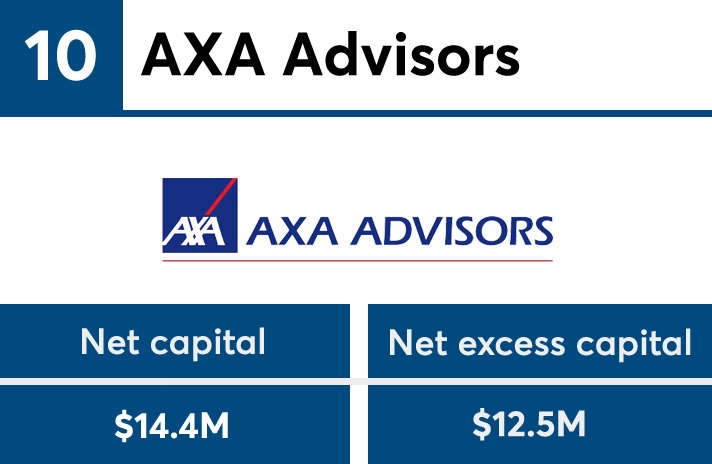
The combined net capital available to the 10 IBDs with the highest liquidity reserves jumped 37% to $385.3 million over the past three years, according to firms submitting data as part of
The new leader has emerged out of a group including
Two major IBD networks ― Advisor Group and Cetera Financial Group ― did not disclose their total net capital as part of the survey, but Ladenburg Thalmann said it had net capital of $37.2 million from its five IBD subsidiaries. The top 10 list only includes individual firms providing their own data, though.
The metric provides a view, albeit a clouded one, into the firms’ futures, according to Carolyn Armitage, a managing director at investment bank and M&A consulting firm Echelon Partners.
“They are preparing their reserves for what comes next, whether that’s the potential softening of the economy or an acquisition,” Armitage says of IBD firms with the highest net capital figures.
“Some of the firms don’t have to publicly disclose it or may not want to for a variety of reasons, whether it’s a defensive or offensive move, depending on what they’re preparing for,” she adds. “It’s challenging to predict what the reserves mean, because it could be a variety of potential outcomes.”
M&A deals have certainly represented a common outcome in the past year. MassMutual
Advisor Group has already unveiled two major acquisitions so far this year, snapping up Capital One Investing’s
Three out of the network’s four IBD subsidiaries made the top 10 in net capital
Advisors at such well-capitalized firms should take comfort in their firm’s stability amid the rising M&A momentum of recent years, Armitage says.
At the same time, however, she points out that firms must ensure any potential future acquisitions are “balanced with reinvesting that capital for growth initiatives” for their advisors.
To view the top 10 firms ranked by their net capital, click through the slideshow. For the top 25 IBDs by their 2017 revenue,

10. AXA Advisors
Net excess capital: $12,509,000
Net capital rank: #10
2017 revenue: $786,527,000
FP50 overall rank: #8

9. Centaurus Financial
Net excess capital: $12,509,000
Net capital rank: #9
2017 revenue: $147,028,000
FP50 overall rank: #33

8. Principal Securities
Net excess capital: $13,973,000
Net capital rank: #8
2017 revenue: $299,570,000
FP50 overall rank: #22

7. CUNA Brokerage Services
Net excess capital: $14,562,000
Net capital rank: #7
2017 revenue: $172,600
FP50 overall rank: #29

6. Commonwealth Financial Network
Net excess capital: $12,185,000
Net capital rank: #6
2017 revenue: $1,241,572,000
FP50 overall rank: #4

5. Lincoln Financial Network
Net excess capital: $27,200,000
Net capital rank: #5
2017 revenue: $740,186,000
FP50 overall rank: #9

4. Waddell & Reed Financial Advisors
Net excess capital: $27,774,000
Net capital rank: #4
2017 revenue: $476,612,000
FP50 overall rank: #13

3. Raymond James Financial Services
Net excess capital: $34,238,000
Net capital rank: #3
2017 revenue: $2,071,244
FP50 overall rank: #3

2. LPL Financial
Net excess capital: $91,758,000
Net capital rank: #2
2017 revenue: $4,281,481,000
FP50 overall rank: #1

1. MML Investors Services
Net excess capital: $137,535,000
Net capital rank: #1
2017 revenue: $1,050,377,000
FP50 overall rank: #5





